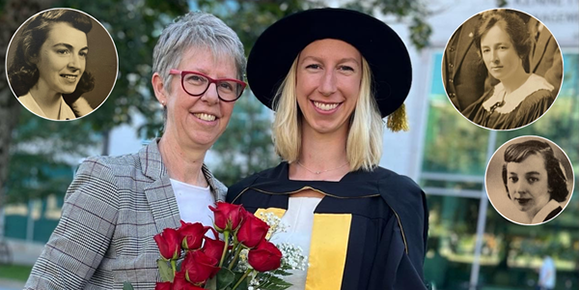
Dorothy Yates (BA'53) (top left inset), Anna (Yates) MacNeill (BA'23) (top right), Elizabeth Watts (DPH'52) (bottom right), Jennifer Watts (MURP'96) and Sophie Watts (PhD'23) are all members of the same family, and all Dal alumni. (Submitted images)
When Sophie Watts (PhD’23) was in the last year of grad school studying apple-breeding techniques, she made an interesting discovery about her own family tree. She was about to become the fourth generation of women in her family to graduate from Dal.
Sophie believes that has influenced her in ways she hasn’t fully realized. “The fact that we all did this at Dal is a really awesome coincidence,” she says.
It’s not the only coincidence that is notable. Sophie completed her degree exactly 100 years after her great grandmother, Anna Yates (later MacNeill) (BA’23) (1898-1970), started the family’s impressive legacy. That continued with Sophie’s grandmother, Elizabeth Watts (DPH’52) (1927-2010), her great aunt, Dorothy Yates (BA’53) (1925-2011), and her mother, Jennifer Watts (MURP’96), who had Sophie while completing her master’s studies. That inspired Sophie to dedicate her thesis to her great grandmother and the women who went to Dal before her.
“It was really amazing to think about all that while watching Sophie walk across the stage during her graduation,” says Jennifer. “It speaks to the love of education that was passed down through our family.”
Although all four generations of women followed different paths after graduation, they shared a dedication to making a difference. Elizabeth became a registered nurse and worked in public health for several decades while engaging in advocacy work in the community. Jennifer served two terms as a Halifax Regional Municipality councillor and was CEO of the Immigrant Services Association of Nova Scotia for six years. And Sophie is contributing to food security through her research on genomic techniques for better breeding of plants.
“We’ve always thought about what it means to be a citizen both in your own community and in the world, as well as the responsibilities that come with that,” Jennifer says. “I believe that commitment to building more resilient communities is even more significant today.”
The seeds of change
Another Dal connection also influenced Sophie’s path: her father, Dr. Richard Donald, who served as associate dean of research with the Faculty of Agriculture.
“His experience sparked my interest,” she says. “I saw how agriculture connects people. It's a science, but it's also really tightly linked to a lot of social issues, so I’m always thinking about how the work I’m doing can be brought out into the world in ways that are beneficial.”
Beyond these Dal connections, it was an opportunity to work as a lab technician with Dr. Sean Myles, the Canada Research Chair in Agricultural Genetic Diversity, at the that ultimately brought Sophie to the university. A collaboration between Agriculture and Agri-Food Canada and Dal, it is exploring ways to breed better apples by studying the genes of more than 1,000 varieties.Ã˝Ã˝
‚ÄúI really enjoyed the research, and it just made sense to do my PhD at Dal based on the program and his lab,‚Äù she says. ‚ÄúApples are a really important crop for the region, and they offer a great entry point to talk about how to use these tools to improve plant breeding.‚ÄùÃ˝
Sophie is continuing to explore new genomic techniques for breeding plants as a postdoctoral researcher with the Molecular Plant Breeding group at ETH Zurich. “I think about how my family’s history and my education allowed me to come here,” she says. “It’s really nice to have the opportunity to live in a different country and work in an area where I have been trained.”
Jennifer, who is enjoying retirement in Cape Breton, is delighted that Sophie is working toward positive change, just as she and Elizabeth did. “It’s important to be looking at food security issues right now, especially with the impacts of climate change,” she says. “We need new ways to protect and enhance our food sources, so I am very proud and supportive of the work she is doing.”
